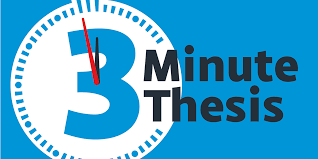November 2019

The purpose for me to compete in the 3MT was to gain an alternative experience. Typically, as graduate students, much of our presentations are designed for an audience from our own field. The jargons are well understood, the basics of the topic are already known, and the focus is more on the new findings, the minute details that add novelty to our research. 3MT, if not the exact opposite, is very close to that. The audience does not know the jargons; the things we consider as basics may be entirely new knowledge/information, and the focus shifts to the bigger picture, the broader impacts of the research.
The working sessions are a must; they give you an insight into the expectations. If you ever plan to participate, my suggestion would be to go prepared with your initial ideas about the topic of the working session. For example, if it’s a working session for visual, have an initial design of slide ready, if it’s a research outline session, then have a draft of it prepared. I fell into the trap of thinking that I had the right idea of how to present my research and thus was not able to make the best use of these sessions. One of the reasons for me not being well prepared for the sessions was that I wanted to participate on my own time, so most of the preparation happened after hours at home. So, if you are in same situation, practice session is a must. Participating in the practice session would give an initial deadline (for all those procrastinators out there) and would also get you a feedback before the competition and giving you enough time to make relatively essential changes/additions.
With the above said, the working session also give an opportunity to interact with other grad students and helps you get exposed to varied fields of research. If anything, I really enjoyed these interactions. The best thing was to be able to put forward your research to an educated audience. In a way, it’s the first requirement of 3MT, can you explain your research to someone outside of your field. These interactions are the best way to gauge how good or bad you are at explaining your research and gives you an initial template to work with.
The preliminary competition is the last step unless you get to go to the finals. It was a significant learning experience. I had my speech ready; I had practiced it a few times and was feeling confident that the way I have written my content it is pretty good and should be easily understood by anyone irrespective of the background. The speech went fine, with a few nervous glitches, nothing major, and I was done — time for the critique. The first judge pointed out that how I was able to explain my research methodology quite adequately, but then he got confused as to what exactly my subject was. You see, I work with membrane filters (water filters), and in my research, I try to understand the reasons and mechanisms that lead to eventual replacement of these filters (you must have replaced a few of the cartridges in your Brita). So, to put into a more general context, I presented myself as a Doctor of Water filters trying to figure out the reasons behind their sickness or death (that’s when you replace the filters). In my mind, it was a perfectly good metaphor with well-established analogies; however, one of the judges pointed how that how she got confused as to whether the membranes were actual living things. This pointed out an apparent fallacy in my argument; I realized that even though I was presenting my research using a metaphor or an analogy, I should have first established the analogy. I proceeded with my own understanding of the analogy, and even though I did not use any jargons or technical terms, I still confused my audience.
What I learned? Most important lesson I learned is that I should have gotten feedback from a lay audience about the content and structure of my speech. I still think that the metaphor was a smart one, but it needed a little bit more context. The idea of PhDs getting pigeonholed seems to be valid to some extent, and my experience in this competition made me realize that. I certainly think that the purpose of learning with which I went was surely fulfilled and moving on has given me a better understanding how to improve my approach towards explaining my research to a lay audience.
My suggestions for people looking to participate. I think I have listed quite a few of my mistakes, which should serve as suggestions. I would advise all Ph.D. and graduate students working towards a thesis to participate; it really gives you an opportunity to understand your own research better with a bird’s eye view, which we seldom do.
---Kunal Gupta
Kunal Gupta is a doctoral student in the Department of Civil and Environmental Engineering